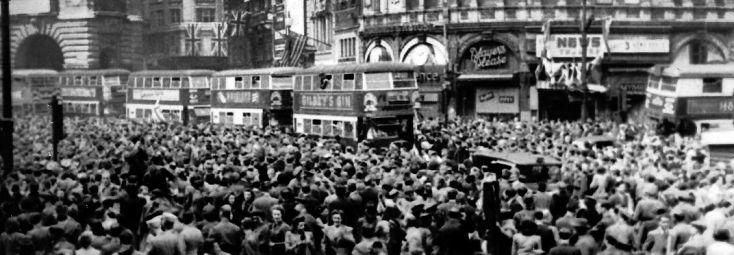
Friday June 12 2020
A NEW DAY DAWNS
The happenings of the past month will always be reckoned as amongst the most momentous in the world’s history. We have been living through experiences too profoundly moving and too important ever to be forgotten. The measured tones of Mr Churchill announcing the unconditional surrender of the enemy, the devout accents of His Majesty The King speaking like a father to his people, the vivid reports from war-correspondents at the Front, the vociferous cheering of the vast crowds before Buckingham Palace and in Parliament Square all brought home to every heart the greatness of the hour.
Yet, apart from the natural and wholesome exuberance with which the nation's relief found outlet wherever people were gathered in any number, the prevailing mood was one of sober thankfulness rather than of exhilaration. The first instinct of millions was to resort to a place of worship and there join in giving thanks to God and in seeking His blessing and guidance for the days to come. For, even with victory in Europe achieved, there is little temptation to light-heartedness or shallow optimism. The cost has been too terrible; there are too many sad hearts at home, too many hungry, suffering, homeless people abroad; and too many difficulties facing the nations in their mutual relations and each nation in its own domestic life.
A recent writer has referred to the autumn of 1918 as the time when “peace broke out”. Peace has broken out again- at least in half the world; and it will make demands on us hardly less onerous than those of war. One great ground of hope that this time the fruits of peace will indeed be reaped lies in the fact that today people realise, as they did not in 1918, that such fruits have to be toiled for and do not of themselves fall ripe into the hand.
THE CHRISTIAN IDEAL IN AN IMPERFECT WORLD
The tasks of peace will certainly require men not only of goodwill but also of clear thought and practical ability. In an address which will be found reproduced on a later page, the American politician, Mr John Foster Dulles, reminded a church conference how easy and how futile it is to put forward, as solutions of our national and international problems, Utopian perfectionist schemes quite out of relation to what is practicable and possible in the present condition of the world. He was speaking to an American audience and had in mind a certain tendency towards an ineffective, sentimental idealism, which he detects in the minds of some American religious leaders.
But his words are of significance for us all. Should a Christian ever tolerate anything short of this absolute Christian standard? Is compromise ever justifiable? Is it ever right to co-operate in schemes, which fall short of a Christian ideal impossible of present achievement? Such are the questions he raises, and the answers which he, speaking both as a statesman and as a sincere Christian, would give are interesting and important.
CHRISTIAN RECONSTRUCTION IN EUROPE
Many people have been asking, What is the World Council of Churches doing in the way of helping the stricken Churches of the Continent? Has it got to work yet? What form is its aid taking? What are the most urgent needs? Well it is getting to work. Already Reconstruction Committees have been formed in France, Holland, Belgium, Switzerland, the USA, and the United Kingdom. Others will be formed in the more recently liberated countries. At the Geneva centre, the Reconstruction Department has, as its Chairman, Dr Koechlin, President of the Swiss Protestant Federation; and, as chief of its International Secretariat, Dr Hutchison Cockburn.
News of the more urgent needs is pouring in. France and Holland need temporary buildings to replace the many destroyed churches; supplementary salaries are needed for pastors and lay workers; paper is needed for church books and periodicals; Bibles by the million. There is a great hunger for Swiss, English, and American recently-published theological works to break down the “intellectual black-out” of the war years. Emergency colleges are being opened, but students need bursaries. Dutch ministers urgently need bicycles (thousands of bicycles were looted by the Germans). Such are the requests and they are steadily increasing. Already gifts towards meeting them are coming in from America, Switzerland, and Sweden. The British Council of Churches has undertaken to raise £1,000,000, and in a great many Churches the collections taken at services on Victory Day were devoted to this purpose. But much more will be required before this goal is reached.
Previous: Why the Fear of Science?
Website by Adept